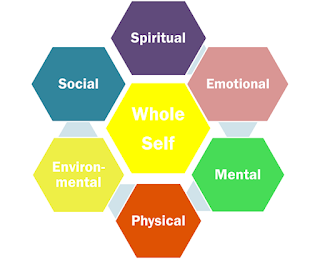Holistic counseling is rooted in the belief that every individual is a unique entity consisting of various interconnected parts. It recognizes that mental and emotional well-being cannot be isolated from physical health and spiritual alignment. Rather than treating symptoms in isolation, holistic counseling aims to address the underlying causes of distress and promote overall wellness.
Welcome to a world of holistic health, metaphysics, the paranormal, and the esoteric. These fascinating subjects ignite our curiosity and offer a glimpse into the unknown. Let's delve into the depths of these unique realms --intertwining personal experiences and professional knowledge. Through our explorations, we'll uncover insights that enrich our well-being.
Sunday, August 20, 2023
Well-Being Through Holistic Counseling
Friday, August 11, 2023
The Power of Opposition
In a world that often celebrates unity and consensus, it may seem counterintuitive to consider the strength that can be found in opposition. However, history has repeatedly shown us that adversity and opposition have the potential to spur growth, innovation, and progress. Let's explore the concept of strength in opposition, highlighting how it has shaped societies, individuals, and ideas throughout time.
Nurturing Resilience:
Opposition forces individuals and communities to confront challenges, pushing them to develop resilience. When faced with adversity, people often discover a hidden wellspring of strength within themselves, enabling them to overcome obstacles and achieve personal growth. Through opposition, we learn to adapt, persevere, and thrive in the face of adversity.
Fostering Innovation:
Opposition can be a catalyst for innovation and change. Throughout history, major breakthroughs have emerged as a result of opposing viewpoints challenging established norms. By questioning existing practices and ideologies, individuals and societies are compelled to seek new solutions and alternative perspectives. The clash of opposing ideas fosters creativity, leading to the development of new technologies, philosophies, and approaches.
Strengthening Democracy:
In democratic societies, opposition plays a crucial role in ensuring accountability, transparency, and good governance. Political opposition provides a necessary check on those in power, preventing the consolidation of authority and encouraging healthy debate. Through constructive criticism and differing perspectives, opposition parties help refine policies, ensuring that decisions are made in the best interests of the people.
Fostering Personal Growth:
Opposition can be a powerful catalyst for personal growth and self-discovery. When faced with opposing viewpoints, individuals are challenged to critically evaluate their own beliefs and values, fostering self-reflection and personal development. By engaging in respectful dialogue and considering alternative perspectives, individuals can expand their knowledge, empathy, and understanding of the world around them.
Cultivating Diversity:
Opposition encourages the cultivation of diverse ideas, perspectives, and experiences. When different viewpoints clash, they have the potential to enrich society by challenging existing norms and promoting inclusivity. By embracing opposition, societies can create spaces that value diversity, encouraging the exchange of ideas and fostering a more inclusive and equitable world.
Embracing Infinite Possibilities
Embracing Infinite Possibilities: A Reflection on "Seven Life Lessons of Chaos" Twenty years ago, amidst a series of p...

-
Burnout is a state of mental, physical, and emotional exhaustion caused by excessive and prolonged stress. It can affect anyone, regardless ...
-
In a world characterized by diversity and individuality, the concept of Oneness holds profound significance. Oneness refers to the interconn...
-
We live in a fast-paced world where many people feel overwhelmed by stress. Balancing work, relationships, and personal goals can often tak...






